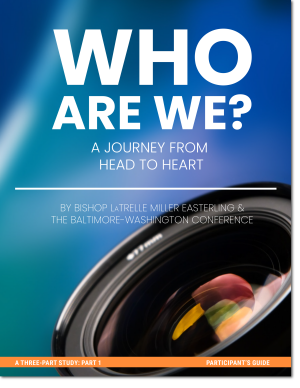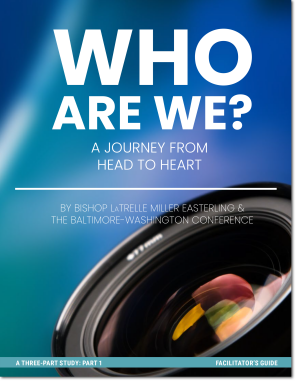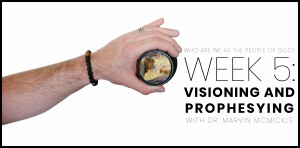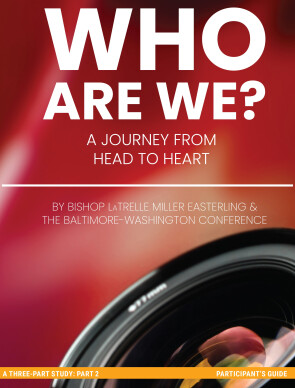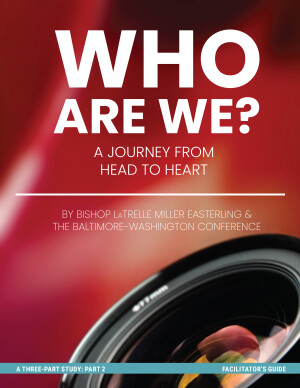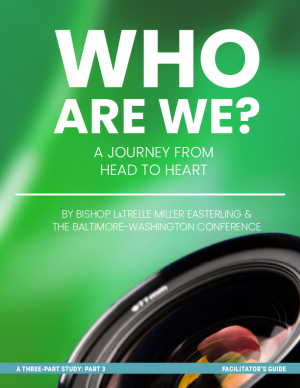Who Are We?
A Journey From Head to Heart
As the church faces an uncertain future, churches in the Baltimore-Washington Conference are called to explore the heart of their faith with this 18-week interactive study on who we are as a people of God, as United Methodists, and as the people of the Baltimore-Washington Conference. This interactive resource can be used in a variety of ways in congregations.
Why This Study Now?
Our beloved denomination is in the midst of another pivotal moment in history. Globally, in our churches, we are considering the future of the denomination, what it means to be the Church, what it means to be United Methodists, and what it means to be spirit-filled Christ followers making disciples of Jesus Christ for the transformation of the world in this present age. Some may question, “Will we remain united? Will we create a new form of unity? Will we dissolve? Will the Church continue to be able to give a faithful voice and witness to the will of God in the days ahead? What is the will of God?” There are many conversations and many questions that may arise in our uncertainty. We can see the ground shift as we engage in strategic sessions, pour over new plans, and predict the year to come. These are natural and necessary steps. And in the midst of all of our uncertainty, this we know for sure – God is. God is with us and God’s Spirit has the power to birth in us a common understanding of how we might live together, disciple together, love together and serve God together.
This Bible Study was developed so that we might enter into a process of discernment and wonder together. It isn’t meant to cater to one outcome or cajole participants into a certain line of thinking. Rather, receive this study as an invitation into communal dialogue chiefly interested in our common roots and the common interest we share as United Methodists within the universal body of Christ today.
This study was designed to center us in our core identity. And so we ask – Who are we? Who are we as the people of God? Who are we as the people called Methodists shaped by Wesleyan theology? Who are we as the members of the Baltimore-Washington Conference? Who are we becoming as we journey on toward perfection? It is our deepest hope that you will allow responses to emerge around the room and that you will receive these responses with great care. Furthermore, it is our hope that as we study and wrestle with Scripture alongside people we know, and hopefully with people we do not know so well, that we will pay close attention to and compassionately engage one another, quiet ourselves and await God’s voice in our discernment in order to make room for emerging responses that can guide us.
a guide: what to expect
As you begin this study, we invite leaders and participants to explore and reflect on the following materials, which will enrich the group’s experience.
Understanding and Interacting with the Sacred Text
The Word of God is our Word, meant to speak to us now and inform our lives and our discipleship. The Word of God is a breathing expression between Creator and Creation, alive and at work with us.
What would it mean for us, as United Methodists, if we presupposed that others love God as much as we do; that others have dedicated themselves to follow Christ as passionately and faithfully as we have; that others open themselves to the movement and truth of the Holy Spirit as we do? Might we presuppose that others hold Scripture as sacred and precious as we do?
In these presuppositions, we free ourselves (as much as humanly possible) from the bondage of judgment, ridicule, superiority, dismissal and disdain. We open ourselves, not to the possibility of losing our faith, but to the possibility of seeing through a different lens and thereby understanding from another perspective. At the conclusion of this study, we hope that you can have a deeper appreciation of how others view God and a deeper understanding of our own view. In our viewfinder, we just might make out more fully who God is calling us to be as United Methodists and as the Baltimore-Washington Conference at this particular moment.
What to Expect
You won’t find an exhaustive and definitive study here. You will find a wholehearted attempt to capture frames of current critical conversations that we need to have as a people of faith. You are invited to bring your experience to this content as you share with others in your community. Do so knowing that there are fellow United Methodists throughout the Baltimore-Washington Conference engaging the same material, sharing their own experiences with one another, and listening attentively to what the Spirit would yet teach us. May God’s grace be sufficient for the journey ahead. To God be the Glory!
Expect to learn something new in your brave space as you journey through the study using the Who Are We Affirmation.
Intentionally set aside time to meditate on the Scriptures, pray, be in conversation with one another and grow in fellowship with one another. You will also have an opportunity to interact with 8-12 minutes of video content from several conversation partners across our connection.
Group Study Suggestions:
As you approach this study, please keep in mind that there is no one “right way” to engage together. As your group develops a shared culture, remember that you are taking up a collective lens. Each person’s contribution brings new opportunities for shared creativity and wisdom.
We have included some tools for creating safe and bold spaces. As a first activity, begin your study with reviewing the Who Are We Affirmation and make modifications as necessary. We have also included guidelines for RESPECTful Communication and Mutual Invitation (Appendix A) to help maintain a space where each voice is honored.
Stay curious. Even if your fellow group members are deeply known to you, prepare to be surprised by how God’s grace will show up in and through each participant. Celebrate that groups across our Conference are affirming the Spirit’s presence with us in this season through shared study. Your holy conversations as a group are a part of a larger sacred dialogue. Each time you gather, you contribute to the widening perspective of our faith and the wideness of God’s mercy alive among us.
Who Are We Affirmation
In the gift of this moment, we affirm that we are divinely loved and lovable.
We are the children of God.
Together, we will learn from the actions and words of one another.
Christ’s lessons on love are centered in how we treat others and in how we treat ourselves.
We will exercise courage in this study as we share stories of struggle and strength.
We will stay at the table and receive those stories with grace.
We will not be afraid to launch into the deep.
We will commit to the vulnerability necessary to allow God to break us open.
We will set and respect boundaries and honor confidentiality together.
When uncertainty arises, we will remember the Spirit of “peace that passes our own understanding” and can intercede for us.
We will remember that even when we don’t feel “United,”
the uniting love of Christ can reveal a pathway to greater
wisdom and mutual respect.
No matter what, there is a place for each one of us in this study together.
Let us hold each other up in prayer, hold each other accountable in love, and
trust that our God is making all things new.
Thank you for the gift of being present to one another in this holy time.
Part 1: Who Are We as a People of God?
“Who Are We?” is an introspective study of head and heart. Part one of the three-part study takes a deep dive into exploring who we are as God’s children. Out of that, we are invited to reflect on where we have missed living out our divine inheritance both personally and as a gathered community of faith. “Who are We as the People of God?” begins with seeking fresh insights into the nature of God, examines our identities as enslaved people, and continues with our journey through wilderness toward ongoing liberation from bondage and celebrating that freedom. Discover what it means to live out of the fullness of our identity in God and bless multitudes as a result.
Download the Participant's Guide or facilitator's guide below
Click on the images below to view the curriculum for the week.
Please let us know if your church is engaging in the study and with whom so that we might pray for your time together and provide additional materials and support as needed.
We are also interested in collecting testimonials and resources you have found helpful in this deep introspective work. Please send them to Communications.
Appendix A: Additional Ground Rules
Respectful Communication Guidelines by Eric Law and Krista Tippett
As a way to create a brave and safe space for faithful dialogue, please consider using the RESPECTful Communication Guidelines by Eric Law and the process of Mutual Invitation. These guidelines are written in a way for you to share with your group. If your group is larger than seven people, consider breaking people into smaller groups and provide time for sharing.
R = take RESPONSIBILITY for what you say and feel without blaming others.
E = use EMPATHETIC listening.
S = be SENSITIVE to differences in communication styles.
P = PONDER what you hear and feel before you speak.
E = EXAMINE your own assumptions and perceptions.
C = keep CONFIDENTIALITY.
T = TRUST ambiguity because we are not here to debate who is right or wrong.
Mutual Invitation
Taken from The Wolf Shall Dance With the Lamb by Eric Law
In order to ensure that everyone who wants to share has the opportunity to speak, we will proceed in the following way: The leader or a designated person will share first. After that person has spoken, he or she then invites another to share.
Whom you invite does not need to be the person next to you. (As a matter of fact, it is best if it is NOT the person next to you.) After the next person has spoken, that person is given the privilege to invite another to share.
If you are not ready to share yet, say “I pass for now” and you will be invited to share later on. If you don’t want to say anything at all, simply say “pass” and proceed to invite another to share. We will do this until everyone has been invited.
We invite you to listen and not to respond to someone’s sharing immediately (also known as crosstalk). There will be time to respond and to ask clarification questions after everyone has had an opportunity to share.
GROUNDING VIRTUES by Krista Tippett from On Being Project
Taken from Krista Tipppett’s Grounding Virtues: What we Practice We Become
WORDS THAT MATTER
We are starved for fresh language to approach each other. We need what Elizabeth Alexander calls “words that shimmer” — words with power that convey real truth, which cannot be captured in mere fact. Words have the force of action and become virtues in and of themselves. The words we use shape how we understand ourselves, how we interpret the world, how we treat others. Words are one of our primary ways to reach across the mystery of each other. As technology reframes the meaning of basic human acts like making and leading and belonging, the world needs the most vivid and transformative universe of words we can muster.
HOSPITALITY
Hospitality is a bridge to all the great virtues, but it is immediately accessible. You don’t have to love or forgive or feel compassion to extend hospitality. But it’s more than an invitation. It is the creation of an inviting, trustworthy space — an atmosphere as much as a place. It shapes the experience to follow. It creates the intention, the spirit, and the boundaries for what is possible. As creatures, it seems, we imagine a homogeneity in other groups that we know not to be there in our own. But new social realities are brought into being over time by a quality of relationship between unlikely combinations of people. When in doubt, practice hospitality.
HUMILITY
Humility is a companion to curiosity, surprise, and delight. Spiritual humility is not about getting small. It is about encouraging others to be big. It is not about debasing oneself but about approaching everything and everyone with a readiness to be surprised and delighted. This is the humility of the child. It is the humility in the spirituality of the scientist and the mystic — to be planted in what you know, while living expectantly for discoveries yet to come. The wisest people we’ve interviewed carry a humility that manifests as tenderness in a creative interplay with power.
PATIENCE
Like humility, patience is not to be mistaken for meekness and ineffectuality. It can be the fruit of a full-on reckoning with reality — a commitment to move through the world as it is, not as we wish it to be. A spiritual view of time is a long view of time — seasonal and cyclical, resistant to the illusion of time as a bully, time as a matter of deadlines. Human transformation takes time — longer than we want it to — but it is what is necessary for social transformation. A long, patient view of time will replenish our sense of our capacities and our hope for the world.
GENEROUS LISTENING
Listening is an everyday art and virtue, but it’s an art we have lost and must learn anew. Listening is more than being quiet while others have their say. It is about presence as much as receiving; it is about connection more than observing. Real listening is powered by curiosity. It involves vulnerability — a willingness to be surprised, to let go of assumptions and take in ambiguity. It is never in “gotcha” mode. The generous listener wants to understand the humanity behind the words of the other and patiently summons one’s own best self and one’s own most generous words and questions.
ADVENTUROUS CIVILITY
The adventure of civility for our time can’t be a mere matter of politeness or niceness. Adventurous civility honors the difficulty of what we face and the complexity of what it means to be human. It doesn’t celebrate diversity by putting it up on a pedestal and ignoring its messiness and its depths. The intimate and civilizational questions that perplex and divide us will not be resolved quickly. Civility, in our world of change, is about creating new possibilities for living forward while being different and even continuing to hold profound disagreement.
An Expression of Gratitude
Beloved, many hands make light work. That could not be more true of this vision, which has now become reality. I am indebted to everyone who contributed to this study, whether that contribution was large or small. And, as we all know, once you begin listing persons, someone will inevitably be overlooked or omitted. If that is the case, please forgive me in advance.
I would like to thank each of the content presenters: the Revs. Eliezer Valentín-Castañón, Bruce Birch, Marvin McMickel and Zina Jacque, and Rabbi Joshua Martin Siegel.
I would like to thank our editorial team, who included the Revs. Zina Jacque, Claire Matheny and Bryan P. Stone.
I would like to thank our design team of Alison Burdett, Erik Alsgaard, Kayla Spears, Cheryl Cook and Sharonda Jones.
I would like to thank those who contributed their insights into the nature of God: Taeron Flemming, Emma Escobar, Kim Carr, Richard Willson, Karen Conroy, Moorosi Mokuena, Ophelia Brown Carter, Ryan McDanill, Ben Rigsby, Cristin Cooper, Frank Robert, Chris Dillard, Hjarman Cordero and the Revs. Daniel Mejia and Emily Hart, Yu Jung Hwang, and many others.
And, I would especially like thank Christie Latona, Melissa Lauber, Myca Jones and Rev. Stacey Cole Wilson for doing so much of the heavy lifting.
I cannot thank you enough. To God be the glory! – Bishop LaTrelle Easterling
Local Church Media Kit
Artwork and materials have been provided for you to help get the word out about the study that you are hosting or even a sermon series you may feel called to create, based on Who Are We? A Journey from Head to Heart.
Your media kit includes:
- Artwork with space to fill in the details for your church;
- Promotional and introductory videos for use in a variety of contexts; and
- Suggested messaging to help you craft announcements on social media or in your church communications.
ARTWORK:
- Part 1 Flyer
- Participant Guide Cover
- Facebook Cover
- Weekly Quotes from Video as Polaroid Snapshots (will automatically download as a .zip file)
- PowerPoint Images (will automatically download as a .zip file)
- Invitation for Social Media, Bulletins or Newsletters
Most of this artwork has space for you to customize. In order to do that in a way that maintains the integrity of the design, we recommend using a free online tool called Canva. You will simply upload the file you want to modify and then use either the built in “Poppins” or “Roboto” font to add your customized information (like location, date and time). Here is a step-by-step guide on how to use Canva.
VIDEOS:
- The Lens Through Which We Look Promotional Videos:
Videos are provided in a variety of formats because YouTube videos are easier to share on social media or in emails, whereas a downloaded version is usually preferred when sharing as part of an announcement in worship, small group or leadership gatherings.
MESSAGING:
A: Join us for a conference-wide study Who Are We? A Journey from Head to Heart so that we might prepare for a future rooted in our shared identity instead of shared anxiety. In Part 1 of this study, we’ll be exploring six topics central to answering the question: Who are we as the people of God?
- Exploring the Nature of God
- Learning Lessons from the Garden
- Remembering Our Story of Exodus
- Embracing God’s Many Names
- Visioning and Prophesying
- Liberating
Download participant materials at bwcumc.org/whoarewe. Leader and Participant guides can be found on that landing page, as well as on the individual weekly pages.
B: Part 1 of Who Are We: A Journey from Head to Heart features six different voices speaking on six different topics: the nature of God; creation; exodus; names of God; the role of prophets; and liberation. Join us for this six-week small group study focused on exploring Who are we as the people of God? Each session is led from the perspective of a different scholar and the study is designed to support rich dialogue and discernment of our shared identity even in the midst of diverse perspectives.
C: We are eager to start a new study called Who Are We as a People of God? which features topics like the nature of God, lessons from the garden, and our story of exodus (among others). There’s still room for more... let us know if you’d like to join us!
Please share with us any materials or messaging you develop so that we might update this resource for other congregations. Email items to BWC communications ( ).
Part 2: Who Are We as the People Called Methodists?
Part 2 of this three-part study, Who Are We: A Journey from Head to Heart, explores our identity as United Methodists shaped in the Wesleyan spirit. While first and foremost our identity is rooted in our understanding of God and in seeking to follow Jesus, there are uniquely Wesleyan ways of experiencing and expressing that. Methodism began as a spiritual movement, a response of the Holy Spirit to the needs of the world. In the six weeks of this study, we’ll delve into the theology and passion of this movement of faith.
United Methodists are a 12-million-member global faith community connected together by the Spirit of God, our Wesleyan theology of grace, a doctrine of personal and social holiness, a holistic understanding of discipleship and reading the Bible, all started by a Holy Spirit-filled movement maker and his brother. Imagine what would happen if all of us reclaimed enough of our shared identity to be able to live and grow together as the church God intends for us to be.
We invite leaders and faith communities in the Baltimore-Washington Conference to begin Part 2 of Who Are We: A Journey from Head to Heart sometime during the week of Jan. 6.
Download the Participant's Guide or facilitator's guide below
Click on the images below to view the curriculum for the week.
Local Church Media Kit for Part 2
Artwork and materials are provided below to help get the word out about the study that you are hosting: Who Are We? A Journey from Head to Heart.
Your media kit includes:
- Artwork with space to fill in the details for your church;
- Promotional and introductory videos for use in a variety of contexts; and
- Suggested messaging to help you craft announcements on social media or in your church communications.
ARTWORK:
- Part 2 Flyer
- Fillable Flyer (will automatically download as a Word doc)
- Full-page art
- Weekly headers (will automatically download as a Word doc)
- Participant Guide Cover
- Facebook Cover
- Banner images for PowerPoint (will automatically download as a .zip file)
Most of this artwork has space for you to customize. In order to do that in a way that maintains the integrity of the design, we recommend using a free online tool called Canva. You will simply upload the file you want to modify and then use either the built-in “Poppins” or “Roboto” font to add your customized information (like location, date and time). Here is a step-by-step guide on how to use Canva.
VIDEOS:
- The Lens Through Which We Look Promotional Videos:
- What is Grace? (1:30) on YouTube or Download
Videos are provided in a variety of formats because YouTube videos are easier to share on social media or in emails, whereas a downloaded version is usually preferred when sharing as part of an announcement in worship, small group or leadership gatherings.
MESSAGING:
A: The conference-wide study of “Who Are We? A Journey from Head to Heart,” continues as we explore who we are as a people called United Methodists. In the next six weeks, we’ll delve deeply into our rich and unique Wesleyan heritage and faith and how it defines us and the church. During Part 2 we’ll explore:
- Our Theology of Grace
- Our Wesleyan Discipleship: the Rule of Discipleship and Means of Grace
- Our way of Understanding Scripture and the Wesleyan Quadrilateral
- Our Founder: John Wesley the Resister
- Our Foundational Doctrine
- Our Unfinished Business: What Really Happened in 1968
Download participant materials at bwcumc.org/whoarewe. Leader and Participant guides can be found on that landing page, as well as on the individual weekly pages.
B: Part 2 of “Who Are We: A Journey from Head to Heart,” raises deep and abiding spiritual questions about what it means to be the people of God called United Methodists. Bishops, preachers, scholars, and disciples will lead you and your small group in six sessions that include videos and rich conversation. In Part 2, you’ll explore ideas about grace; covenant discipleship; the Wesleyan Quadrilateral; how John Wesley, our founder, resisted popular notions of faith; the theological documents that define the denomination; and how race played, and continues to play, a significant role in the creation of The United Methodist Church.
Learn more at bwcumc.org/whoarewe.
C: What does it mean to be a United Methodist? How does grace shape your faith? What role do the Bible, personal holiness, sacred resistance, the Holy Spirit, and race play in the denomination? Explore these questions and more in Part 2 of “Who Are We? A Journey from Head to Heart.” Visit bwcumc.org/whoarewe.
Please share with us any materials or messaging you develop so that we might update this resource for other congregations. Email items to communications ( ).
An Expression of Gratitude for Part 2
I am deeply indebted to everyone who contributed to Part 2 of this study. Their contributions make it a special resource that will greatly enhance our shared understanding of what it means to be people called United Methodists. And, as we all know, once you begin listing persons, someone will inevitably be overlooked or omitted. If that is the case, please forgive me in advance.
I would like to thank each of the content presenters: the Revs. Claire Matheny, Jessica Hayden, Travis Knoll, David McAllister-Wilson, Dana Jones, Rebecca Iannicelli, Mark Gorman, and Sarah Schlieckert, and Bishops Thomas Bickerton and Forrest Stith.
I would like to thank our editorial and design team of the Revs. Erik Alsgaard, Claire Matheny, Bill Brown, Rodney Smothers and Bryan P. Stone, Alison Burdett, Kayla Spears, Cheryl Cook, and Sharonda Jones.
I would like to thank those who contributed their insights into the nature of grace: Taeron Flemming, Emma Escobar, Richard Willson, Moorosi Mokuena, Ophelia Brown Carter, Ryan McDanill, Madison Sadler, Cristin Cooper, Chris Dillard, Hjarman Cordero and the Revs. Daniel Mejia, Mark Gorman, Travis Knoll and Yu Jung Hwang.
And, I would especially like thank Christie Latona, Melissa Lauber, Myca Jones and the Rev. Stacey Cole Wilson for their gifts and contributions. I cannot thank you enough. – Bishop LaTrelle Easterling
Please let us know if your church is engaging in the study and with whom so that we might pray for your time together and provide additional materials and support as needed.
We are also interested in collecting testimonials and resources you have found helpful in this deep introspective work. Please send them to communications.
Part 3: Who Are We as the People of the Baltimore-Washington Conference?
Part 3 of this three-part study, Who Are We: A Journey from Head to Heart, explores our identity as people called United Methodists within the Baltimore-Washington Conference. Our ancestors, who lived out their faith in Maryland, Washington, D.C., and the panhandle of West Virginia, created this vibrant expression of church and made disciples of Jesus Christ close at home and throughout the world. As one of 54 annual conferences in the United States, we have the honor of being the cradle of Methodism in America and pointing, in connection, to a future of hope.
Just as in any family, there are members and stories that make us proud and those that make us question ourselves. In Parts 1 and 2 of the study, we were reacquainted with our identity as the people of God and as the people shaped by the Wesleyan Spirit. We bring these understandings to this final part of the study. You will be learning directly from a descendant of one of the earliest Methodist movement-makers, from those whose family roots go deep in their local churches, from people who have laid their lives on the line for justice and faith, and from those who are just discovering the possibilities and joy of being a part of the Baltimore-Washington Conference.
Together, let us learn from our past as we carry forth the best of our heritage. Let us also work together to transform that which doesn’t reflect God’s reign. The vision of the Baltimore-Washington Conference is “Transformed Lives Transform Lives.” May it be so.
Download the Participant's Guide or facilitator's guide below
Click on the images below to view the curriculum for the week.
Local Church Media Kit for Part 3
Artwork and materials are provided below to help get the word out about the study that you are hosting: Who Are We? A Journey from Head to Heart.
Your media kit includes:
- Artwork with space to fill in the details for your church;
- Promotional and introductory videos for use in a variety of contexts; and
- Suggested messaging to help you craft announcements on social media or in your church communications.
ARTWORK:
- Part 3 Flyer
- Fillable Flyer (will automatically download as a Word doc)
- Full-page art
- Weekly headers (will automatically download as a Word doc)
- Participant Guide Cover
- Facebook Cover
- Banner images for PowerPoint
Most of this artwork has space for you to customize. In order to do that in a way that maintains the integrity of the design, we recommend using a free online tool called Canva. You will simply upload the file you want to modify and then use either the built-in “Poppins” or “Roboto” font to add your customized information (like location, date and time). Here is a step-by-step guide on how to use Canva.
VIDEOS:
- The Lens Through Which We Look Promotional Videos:
Videos are provided in a variety of formats because YouTube videos are easier to share on social media or in emails, whereas a downloaded version is usually preferred when sharing as part of an announcement in worship, small group or leadership gatherings.
MESSAGING:
A: The Baltimore-Washington Conference is the birthplace of Methodism. How does our past serve as prologue to the future before us? https://www.bwcumc.org/resources/who-are-we/
B: As we explore our identity as the people of the Baltimore-Washington Conference, we re-discover the wisdom of head and heart in our spiritual ancestors, Francis Asbury and John Strawbridge.https://www.bwcumc.org/resources/who-are-we/
C: The BWC is one of the most diverse in the church. That diversity can be a strength and a challenge. Does our diversity, as we’re living it out, truly reflect the Kingdom of God? https://www.bwcumc.org/resources/who-are-we/
D: What do we celebrate? What do we mourn? What agitates us? What draws us into God’s presence? Just who are we, really, as the people of the Baltimore-Washington Conference? https://www.bwcumc.org/resources/who-are-we/
E: Sometimes family is exactly what you need. Sometimes family is just hard work.https://www.bwcumc.org/resources/who-are-we/
F: How shall you put your hands to work for God? Your voice? Your mind? Your backbone? Your wishbone? Your soul? And how will that work define us as the people of the Baltimore-Washington Conference?https://www.bwcumc.org/resources/who-are-we/
An Expression of Gratitude for Part 3
Beloved, many hands make light work. That could not be more true as many gifted people worked together to create Part 3 of this important curriculum. I am indebted to everyone who contributed to this study, whether that contribution was large or small. And, as we all know, once you begin listing people, someone will inevitably be overlooked or omitted. If that is the case, please forgive me in advance.
I would like to thank each of the content presenters: Rev. Emora Brannon, Daniel Fisher, Pamela Coleman, John Strawbridge, Rev. Ianther Mills, Rev. Ginger Gaines-Cirelli, Rev. C. Anthony Hunt, Sharon Milton, Megan Blizzard, Ken Ow, Rev. Sung Hwan (Steven) Cho, Nathanial Wright, Rev. Emily Hart, Lutebula “Danny” Pembamoto, Nathan Jones, and Rev. Yolando Pupo-Ortiz. I also thank Rev. Doug Tzan and Rev. Deborah Scott for their contributions.
My gratitude also goes out to those who reflected upon the impact of the BWC in people’s lives: Emma Escobar, Cristin Cooper, Rev. Yu Jung Hwang, Taeron Flemming, Moorosi Mukuena, Rev. Daniel Mejia, and Chris Dillard.
I would also like to thank our editorial team, who included the Revs. Claire Matheny and Erik Alsgaard; and our design team of Alison Burdett, Kayla Spears, Cheryl Cook, and Sharonda Jones.
And, I offer a special word of gratitude to Christie Latona, Melissa Lauber, Myca Jones and Rev. Stacey Cole Wilson for doing so much of the heavy lifting.
I cannot thank you enough.
To God be the glory!
Bishop LaTrelle Easterling
Please let us know if your church is engaging in the study and with whom so that we might pray for your time together and provide additional materials and support as needed.
We are also interested in collecting testimonials and resources you have found helpful in this deep introspective work. Please send them to communications.

